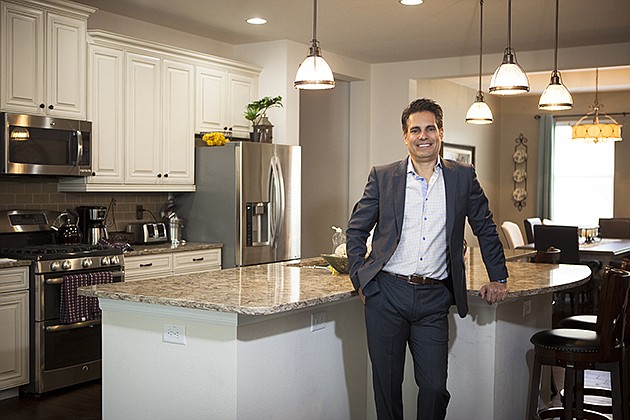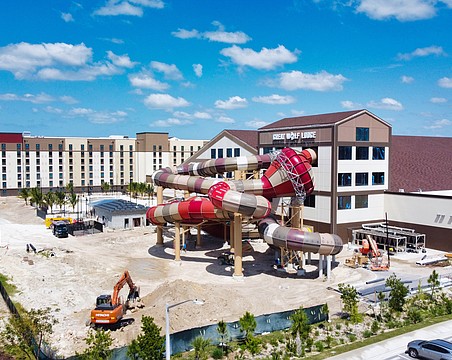Executive Summary
Company. Lily's Promise Industry. Senior living, real estate Key. Company seeks to build a brand in a niche sector of senior living.
The lump-in-the-throat poignancy of working with seniors who suffer from dementia or Alzheimer's disease has been front and center in Patrick Bismuth's business life since 2009.
It ranges from conversations with a 90-year-old woman about long-ago deceased love ones to buying sweatpants with a drawstring for an elderly man who struggles with incontinence.
In this work, Bismuth, a onetime IT consultant who ran his own business working with Fortune 500 companies worldwide, sees a significant business opportunity. It comes through Lily's Promise, a residential senior care company. One five-bedroom house in Sarasota, east of Interstate 75 near Laurel Oak Country Club, opened last year. Another house in east Manatee County, in GreyHawk Landing near Lakewood Ranch, is scheduled to open later this spring. If the first two homes prove successful, Bismuth, 50, hopes to open three new homes a year in the region going forward.
Bismuth has already invested nearly $1 million of his personal savings in Lily's Promise, mostly to buy the homes. In addition to the investment, Bismuth has also regularly confronted his biggest obstacle: industry understanding and acceptance. Florida laws, through the Department of Elder Affairs and the Agency for Health Care Administration, oversee family care homes in private residences. The homes are maxed out at six residents per house, but otherwise follow rules for bigger competitors.
Yet the idea of a home for seniors smack in the middle of a residential neighborhood can be jarring to residents, and can also project what Bismuth calls a false sense of un-sophistication. “There is a stigma attached with small homes that make it hard to market directly to the consumer,” Bismuth says. “They envision small homes being less professional.”
Lily's Promise is a counterintuitive venture in multiple other ways.
Part of the model, for instance, to pay higher wages with a smaller patient-to-caregiver ratio, runs counter to the pack-'em-in model prevalent in senior care. Lily's Promise also makes a point to seek out patients with a higher medical acuity, people who can be more difficult to work with. Because of the high-end model and tougher patients, Lily's Promise only accepts private pay residents, with no Medicare or other programs.
“We want to take the residents who fall through the cracks of assisted-living facilities,” says Bismuth. “It's smart business, but it's also necessary for society.”
Open space
Another differentiating factor in Lily's Promise is going small at all. A current senior living industry trend, particularly in memory care, is to build a series of complexes that make up a neighborhood. That replaces the old way, of building large towers that house residents in dorm-style quarters.
Either way can be costly: Construction of a senior living home runs up to $250 a square foot. Bismuth says his housing costs are considerably lower, around $120 to $130 a square foot.
But Bismuth will spend more on labor. The industry average is around 33% of revenues go toward payroll. At Lily's Promise, says Bismuth, his labor costs are closer to 60% of revenues. The company has seven caregivers, mostly certified nursing assistants, and four managers. Bismuth, in an effort to attract top CNAs, upped the standard starting wage, from around $9.75 an hour to $10.50 an hour. He also offers caregivers a 10% bonus for meeting work attendance and care goals.
Bismuth paid $350,000 for the 2,400-square-foot house in Sarasota and $450,000 for the 3,000-square-foot house in Manatee County. He's spent at least $100,000 more on renovations and upgrades.
The floor plan of a home is a big part of what drives the home-buying decision for the company, says Kim Brownstein, head of business development for Lily's Promise. Open space is essential for both residents and caregivers. “It's nice to be able to see everything at once,” says Brownstein.
The Greyhawk Landing home, with residents expected to move in by May, is a standing example of the high-end approach Bismuth covets. The decor is Florida Keys style, with neutral colors and soft tones. The kitchen is open, with space for multiple employees to prepare meals. “The residents are spending a lot of time indoors,” Bismuth says. “So why not make it as luxurious as possible?”
Other parts of the home have been modified, to meet with industry safety codes, senior living facility regulations and common sense when working with a memory loss population.
“Even though we are a small footprint, we have the same rules,” Bismuth says.
Doorways, for example, were enlarged to make room for wheelchairs. The home also has a high-tech alarm system, with a voice-activated announcement when an unauthorized door opens. The bolt on the front door is commercial grade. The expense is a business necessity, say Lily's Promise executives, in a niche of senior living where residents walking out unwittingly is a major worry. “We go above and beyond to make sure our residents our safe,” says Bismuth.
Turn around
Bismuth's strategy with Lily's Promise comes mostly from two areas: his entrepreneurial background and life lessons learned his mom.
The entrepreneur side started back in his native Montreal, when a 7-year-old Bismuth went door-to-door selling boxed cereal his dad bought in bulk. He later moved to California, where he earned an M.B.A. from UCLA's Andersen Business School. By the time he was 28 he was running his own IT consulting business, traveling worldwide for clients. In 2000, then living in Ohio, Bismuth got into real estate and built a company that bought and rehabbed apartment complexes.
It was through that work that in 2008 Bismuth took over operations of a struggling 200-unit retirement community in Columbus. He helped turn the complex around, and in doing so found a new life passion: working with elderly. He had relatives in the Sarasota area, and, with the obvious demographic lure of the region to his industry, he decided to open Lily's Promise.
His passion, he says, also comes from his mom, Liliane Sarfati, who Bismuth says was “always more concerned for those in her care than herself.” Sarfati, who didn't suffer from Alzheimer's or dementia, died in 2012. Lily's Promise is named after her.
'Push forward'
Bismuth says out of multiple startup challenges, one is something many new businesses in a crowded marketplace face: proof the model works. “We have an idea of a concept,” says Bismuth. “We don't know how we fit in.”
Brownstein, who worked in memory care and senior living in Ohio and relocated to Florida for Lily's Promise, visits other area senior living facilities to introduce the business. Through those relationships and other marketing efforts, Brownstein and Bismuth aim to get in front of their target audience — adults in their mid-40s through mid-60s. Those are people who might have parents at a stage in life that makes them a fit for Lily's Promise.
Another challenge, past marketing, is to create systems and processes that will save time and costs when the business expands beyond two homes. Bismuth has already begun to address that, from payroll software to grocery deliveries. Bismuth believes there's a way to maintain the personal touch Lily's Promise strives for without neglecting the systems that make a bigger operation successful. “You have to duplicate your systems well,” he says, “otherwise you waste too much time.”
Bismuth, so far, is both the numbers guy and the one who helps out with operations, branding, hiring and everything else, down to fetching Amazon packages and mail. His mom's legacy and his business spirit motivate him to push forward on Lily's Promise. “We're excited about making a difference,” he says. “We are excited about helping people who have no other place to go.”
This story was updated to reflect the correct spelling of Liliane Sarfati and the maximum amount of residents allowed in a home-based residential care facility
.






